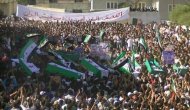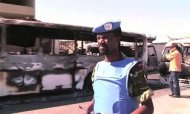The Syrian opposition's new leader said on Sunday that President Bashar al-Assad's regime was on its "last legs," even as Russia warned it would block any move at the UN to use force against its ally.
Britain declined to rule out military intervention,
despite the strong opposition of China and Russia, as the death toll
from the more than 15-month uprising topped 14,100, according to a human
rights watchdog."We are entering a sensitive phase. The regime is on its last legs," Kurdish activist Abdel Basset Sayda told AFP shortly after he was named as the new leader of the opposition Syrian National Council.
"The multiplying massacres and shellings show that it is struggling," he added in allusion to a spate of mass killings of civilians, the most recent of which saw 20 people, most of them women and children, killed in the bombardment of a residential area of the southern city of Daraa on Saturday.
Sayda was elected as the SNC's new leader at a conference in Istanbul, replacing the opposition's first leader, Paris-based academic Burhan Ghalioun, who stepped down last month in the face of mounting splits that were undermining the group's credibility.
Activists accused Ghalioun of ignoring the Local Coordination Committees, which spearhead anti-government protests on the ground in Syria, and of giving the Muslim Brotherhood too big a role.
Sayda, who has lived in exile in Sweden for two decades, is seen as a consensus candidate capable of reconciling the rival factions within the SNC and of broadening its appeal among Syria's myriad of ethnic and confessional groups.
The 55-year-old does not belong to any political party and, although his name is not familiar to many Syrians, SNC officials say he is a "conciliatory" figure, "honest" and "independent".
The opposition grouping has been criticised for not representing the full diversity of Arabs, Kurds, Sunni Muslims, Alawites, Christians, Druze and other ethnic and religious groups in Syria.
Asked about his ambitions as SNC leader, Sayda said the opposition bloc "would focus its efforts on the international community to take a decisive move against the regime."
"We want to strengthen links with activists on the ground and the (rebel) Free Syrian Army, who we will support with all our means", he said.
"The Annan plan still exists but it has not been implemented," he added, in reference to a peace blueprint thrashed out by UN-Arab League envoy Kofi Annan that was supposed to begin with a ceasefire from April 12 but which has been violated daily.
"We will work for this plan to be included under Chapter VII of the UN Charter, to force the regime to implement it and to leave all options open," he said.
Chapter VII allows for sanctions and, in extreme cases, military action.
Russia and China, infuriated by the NATO campaign in Libya last year, have vowed to oppose any military intervention but British Foreign Secretary William Hague refused on Sunday to rule out the possibility.
"We don't know how things are going to develop. Syria is on the edge of a collapse or of a sectarian civil war, and so I don't think we can rule anything out," Hague told Sky News television.
He said the situation in Syria resembled that of Bosnia in the 1990s.
"It is not so much like Libya last year, where we had, of course, a successful intervention to save lives," he said.
"It is looking more like Bosnia in the 1990s, of being on the edge of a sectarian conflict in which neighbouring villages are attacking and killing each other."
The violence has intensified in Syria despite the presence of 300 United Nations observers charged with monitoring a truce that was supposed to take effect from April 12.
On Saturday, at least 111 people -- 83 civilians and 28 soldiers -- were killed, according to Observatory figures, representing one of the heaviest single-day death tolls since the nominal start of the ceasefire.
By midday (0900 GMT) on Sunday, clashes and shelling had killed at least 12 people, the watchdog said.
Hundreds of rebel fighters meanwhile remained holed up in Latakia province, a loyalist stronghold on the Mediterranean coast.
The army sent troop reinforcements to the mainly Alawite province where rebels have grouped in a Sunni Muslim enclave around the town of Al-Heffa, the Observatory said.
Nearly 60 soldiers have died since June 5 in battles with opposition fighters in the enclave, which lies some 50 kilometres (30 miles) from the Turkish border. At least 46 civilians and rebels have also been killed.
Observatory head Rami Abdel Rahman said that the resistance being put up in a province where the majority of the population are members of Assad's Alawite minority showed that the uprising against his regime was truly nationwide.
"The coast is no longer a safe area, and the whole country is now involved in the revolt," he told AFP.


No comments:
Post a Comment